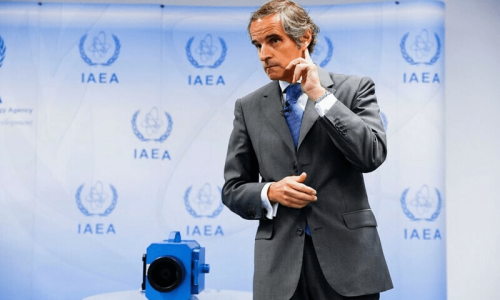
CAIRO: LEADERS of the banned Muslim Brotherhood met Egyptian Vice President Omar Suleiman for landmark discussions on a second day of talks between the government and opposition figures. According to state television and a statement issued by Mr Suleiman's office, the “participants in the national dialogue agreed on a number of political arrangements and constitutional and legislative measures”.
These included the creation of a committee of judicial and political figures “to study and recommend constitutional amendments … by the first week of March”; lifting state-imposed restrictions on the use of the Internet; and ending the government's harassment of media personnel.
However, opposition figures involved in the talks responded warily to the government's offer, which did not include a pledge to bring an immediate end to the 30-year-old rule of President Hosni Mubarak.
The offer also appeared to leave the protesters camped out in Tahrir Square unimpressed. On a day where the military further limited access to the square, thousands more lined up and patiently waited their turn to be allowed through the narrow entry point beside a row of tanks and barbed wire. By nightfall, Tahrir Square was once again full of protesters.
Elsewhere, however, Cairo limped back to some semblance of normality.
Sunday, start of the workweek in Egypt, began cautiously, with early morning traffic thin. But as banks and a few other shops opened, the activity in downtown Cairo began to pick up.
Small queues formed outside banks, delivery vans and garbage trucks appeared on the roads, and the staff at restaurants and stores shuttered for days began to prepare for business.
In the historic Khan al-Khalili bazaar, a tourist magnet, a majority of the shops were still closed at noon and shopkeepers outnumbered tourists. But within a couple of hours, business picked up as small groups of tourists appeared.
By evening, the notorious Cairo traffic was at full cry. Traffic on the October 6 Bridge slowed to a crawl, weaving its way through the tanks, armoured personnel carriers and soldiers stationed near the area overlooking Tahrir Square. But the ordinariness of a partial return to normal life in Cairo could not overshadow the extraordinariness of Vice President Suleiman's meeting with leaders of the Muslim Brotherhood.
As noted by a diplomat, Mr Suleiman, for two decades President Mubarak's intelligence chief, would have directly been responsible for dealing with the banned Muslim Brotherhood until his appointment as vice president last week.
“It's mind-blowing,” the diplomat said, speaking on the condition of anonymity because of official restrictions.
However, the Muslim Brotherhood's U-turn — it had earlier declined to participate in the government-opposition talks which began on Saturday — does not signal that an end to the crisis in Egypt may be at hand.
The central demand of the 'Jan 25 youth movement', the name given to the youthful protests in Tahrir Square, remains for Mr Mubarak to step down immediately.But the statement issued by Vice President Suleiman's office yesterday called first and foremost for “implementing the commitments announced by the president in speech to the nation on 1 February, 2011” — a speech in which Mr Mubarak appeared to rule out resigning.
So almost immediately, on foreign media and through translators to reporters in Tahrir Square, the protesters appeared unwilling to accept the concessions announced by the government on Sunday.
“What we are seeing is a tug of war,” claimed Tariq Youssef, a lecturer at a university in Cairo who supports the anti-Mubarak protesters. “It's still not clear if (the protesters) can win outright.”
The Cairo-based diplomat, though, appeared to suggest otherwise: “This can't go on forever. The protesters can hang on, but the government has to run things, the economy has to be taken care of.”
Day 13 of the protests, then, was like most of the 12 before it. New developments, unimaginable even two weeks ago, occurred, but still there is one constant: uncertainty over Egypt's future.










































Dear visitor, the comments section is undergoing an overhaul and will return soon.